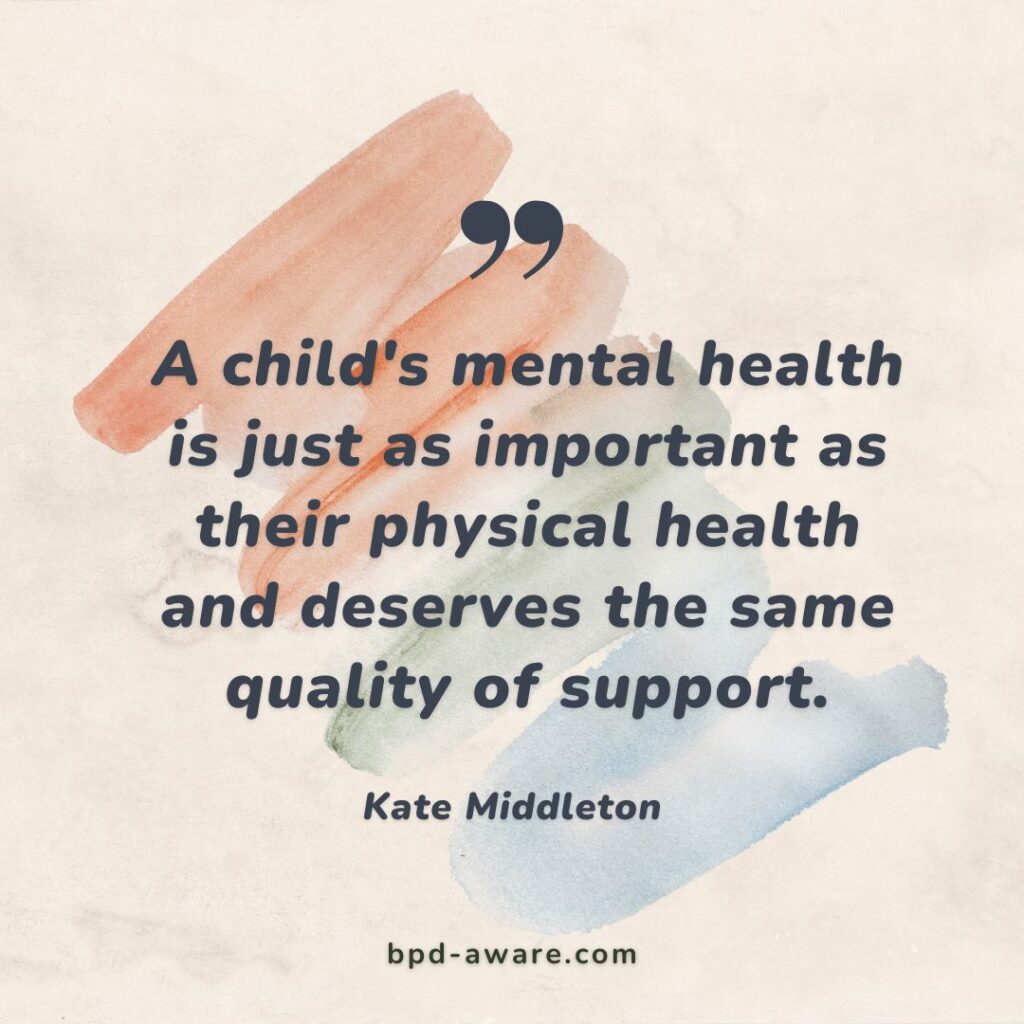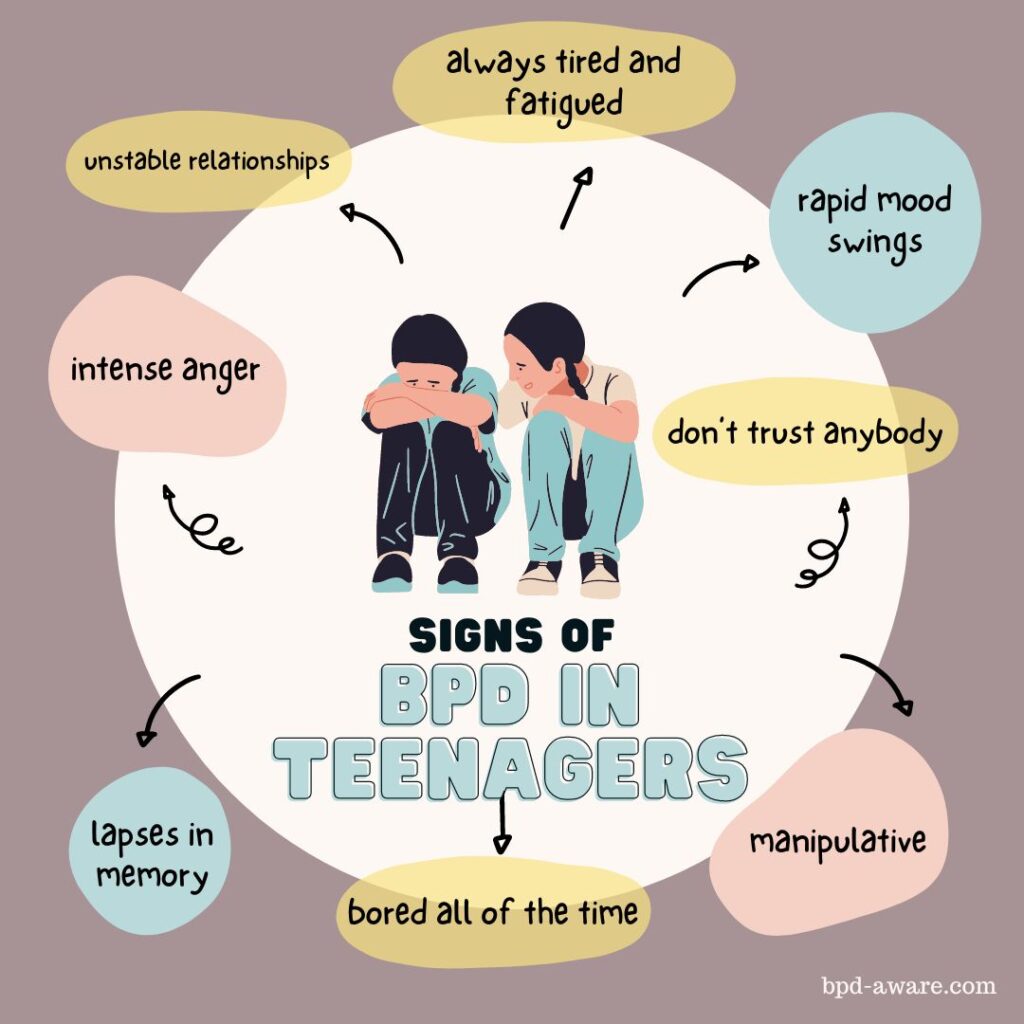Borderline Personality Disorder (BPD) is a challenging condition to live with. Left untreated, BPD can cause severe problems such as the inability to hold down a job, unstable relationships, a lack of self-esteem and self-identity, and poor executive functions. All these issues (and more) mean that it’s crucial to identify whether your child has BPD so that you can help them seek treatment and provide a brighter future.
BPD can be difficult to diagnose, especially in teenagers, as some of the symptoms overlap with typical adolescent behavior. Rapid mood swings can be a sign that your child has BPD, but it can also just be a sign they’re going through puberty and having a tough time regulating their emotions because of an influx of hormones, which they’re not yet used to. However, Borderline Personality Disorder typically develops during adolescence, which is why it’s so important to keep your eye on the situation.
This article doesn’t intend to give a yes/no answer to whether or not your child has BPD, as there are a multitude of factors to consider that no single article can cover. What this article sets out to do is educate you as a parent on the signs to watch out for and the appropriate next steps if you believe your child might have BPD.

With that said, here are the signs that your child might have BPD:
Emotional Instability
Children, especially teenagers, often struggle with their emotions. However, if they are experiencing frequent and intense mood swings that seem disproportionate to the situation, that can be an early warning sign of BPD. Similarly, if they experience periods of intense anger, depression, or anxiety, that can also be an indicator of BPD or another serious mental health issue.
Intense anger is one sign to look out for. Depression and anxiety are unfortunately relatively common, especially in teenagers, but intense anger and rage are huge red flags.
They may also struggle to return to a healthy emotional baseline after a mood swing or intense emotional state.
The more often these periods of emotional instability happen and the more they impact your child’s life, the more likely it is that they have BPD rather than just the traditional teenage struggles. A rough patch once a month is probably nothing to worry about, but if it’s a daily occurrence, you may want to take them to a mental health professional.
Rapid Identity Changes
Someone with BPD will frequently change their identity. It can be their look, their ideals, or their goals in life. For example, they could want to be seen as sporty one week and then suddenly decide they wish to be seen as more of an intellectual the following week.
Again, identity changes aren’t too uncommon in teenagers. The things to look out for are how often they occur, the scale of the changes, and how they impact their lives. Leading a successful life without at least some stability is next to impossible. If a young Bill Gates decided to turn his back on computer programming because he wanted to become a track athlete, it’s doubtful he’d have been the success he’s been.
Unstable Relationships
People with BPD tend to experience volatile relationships. Relationships can refer to romantic relationships, relationships between a parent and child, other members of the family, friendships, and student-teacher relationships.
Signs of unstable relationships include intense and frequent conflicts, a lack of appropriate boundaries, periods of idealization and then devaluation, fear of abandonment, and relationships that frequently switch between on and off. A clear pattern of unstable relationships is a warning sign that your child may suffer from BPD.
Fear of Abandonment
Fear of abandonment is considered to be a core feature of Borderline Personality Disorder. It can be one of the easiest ways to tell if someone has BPD or another mental health condition.
Abandonment fears can manifest themselves in many ways, some obvious, some more subtle. Some people with a fear of abandonment will be very clingy. Others may be manipulative. Others may avoid relationships so they can’t possibly be abandoned. There are other signs which you can read more about in our article about BPD and the Fear of Abandonment.
It should also be noted that someone with BPD may manifest their fear of abandonment differently depending on the nature of the relationship. They could be manipulative with their parents and very clingy within a romantic relationship with their partner. Knowing how your child acts in relationships outside of your own can be difficult. Be as perceptive as you can without overstepping boundaries.
Impulsive and Self-Destructive Behavior
If your child frequently engages in impulsive or self-destructive behaviors, this can be a sign they have BPD. Examples of these kinds of behaviors include making sudden big decisions without considering their potential impact, substance abuse, gambling, getting into physical confrontations, driving recklessly, overeating or not eating at all, going on spending sprees, engaging in multiple sexual relationships at the same time, and committing self-harm.
Again, it’s important to consider frequency and clusters of behavior. Discovering your child got into a fight at school one time is concerning, but alone is unlikely to be a sign of BPD. However, multiple fights, finding drugs in their room, and regularly getting in trouble with the law are certainly signs that something is amiss. It may not necessarily be BPD, but it’s still something that may require treatment.
Chronic Feelings of Emptiness
Chronic feelings of emptiness can be tricky to spot in others as none of us are mind readers. But there are some critical signs that you can watch out for.
If your child always complains about being bored and no longer takes joy in activities they used to live, that can be a sign of a feeling of emptiness inside. Likewise, they may come across as emotionally numb, as if they’re incredibly detached from life. Preferring to be isolated and alone is another sign to watch out for.
Physically, they may suffer from fatigue and an overall lack of energy that doesn’t improve with rest or sleep. This is a sign of depression, which is linked to feelings of emptiness and BPD.
Another thing to watch is their sleep patterns. Do they struggle to fall asleep or have irregular sleep patterns? If you wake up in the middle of the night, do you find they’re still awake? Sleep problems are not uncommon in teenagers, but they may indicate a more serious issue.
Episodes of Paranoia or Dissociation
During periods of stress – such as school exams or the loss of a loved one – adolescents with BPD may experience episodes of paranoia or dissociation. Such periods are pretty rare amongst the average teenage population, so these can be one of the more conclusive signs that your child may have BPD or another mental health condition.
Paranoia manifests as an irrational mistrust or suspicion of others. For example, they may claim that their teacher “hates them” and is “out to get them” when there is no objective evidence. In reality, they may have just scored poorly on their latest test. They may also discredit and distrust information they receive from others.
Dissociation is a mental process in which an individual disconnects from their thoughts, feelings, memories, and sometimes even the world around them. Dissociation can be more challenging to spot, but there are signs to watch out for.
Someone who is dissociating may be thought of as “running on autopilot.” They might not remember what is happening around them and struggle to remember small recent events that they were witnesses to. They may also appear confused and disorientated at times for no real reason. Take care to listen to their voice when they talk. If their voice sounds flat and dull, that can be a sign they’re on autopilot and dissociating.

I Think My Child Had BPD. What Next?
If you believe your child exhibits many of the symptoms above and that it’s having a severe impact on their life, it’s natural to wonder what you, as a parent, can do.
The first you may want to do is sit down and talk to them about their mental health. Teenagers can resist this kind of thing, but it may open a window of opportunity for both of you.
Find a quiet time when neither of you will be disturbed. Choose a private but relatively open place where you can have a free-talking discussion. The living room or kitchen can be great places for these kinds of discussions, as the teenager can retreat to their bedroom if things get too intense. Begin the conversation naturally by asking how they are. Then, you may want to point out that you’ve been worried about them lately and explain why.
If they’re willing to talk, actively listen to them and try not to interrupt; the more they talk, the more you can learn about what’s going on with them. Ask open-ended questions that encourage deep responses.
Depending on how the conversation is going, you may want to bring up mental health and normalize mental health issues. It’s important to teach your child that mental health is as vital as physical health and that treatment options are available. If you have had mental health issues, you may want to share them with your child so they know that anyone can have struggles.
No matter how the conversation goes, if you have concerns about the mental health of your child, then you should look for a local mental health professional who can help. Preferably, they should have experience treating adolescents or BPD; it’s even better if they have experience with both.
Proper diagnosis and a tailored treatment plan can effectively address symptoms of BPD and improve overall well-being. By spotting the problem and seeking treatment, you can save your child many years of pain and suffering.
Sources, Resources, and Further Reading
- Understanding Borderline Personality Disorder in Teens: https://www.mcleanhospital.org/essential/teens-bpd
- Understanding Borderline Personality Disorder (BPD) in Teens: https://www.healthline.com/health/borderline-personality-disorder-in-teenagers
- What Are the Symptoms of BPD in Teens?: https://familyfirstas.com/blog/what-are-the-symptoms-of-bpd-in-teens/
- Signs of BPD as a young child: https://www.reddit.com/r/BPD/comments/1b9cmgg/signs_of_bpd_as_a_young_child/
- Recognizing the Early Signs of BPD in Children: https://goodhealthpsych.com/blog/recognizing-the-early-signs-of-bpd-in-children-what-parents-should-know/
















